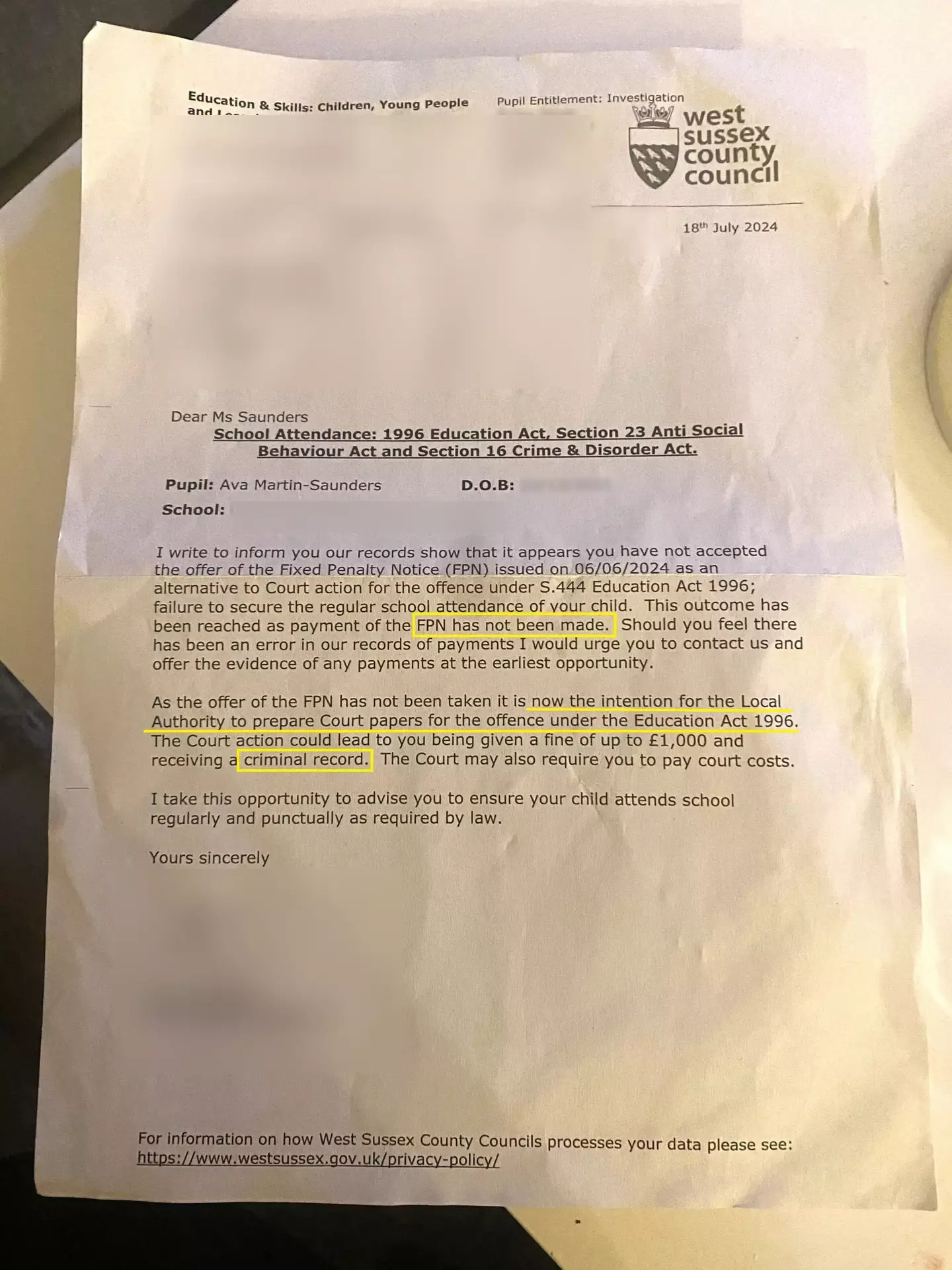Imagine coming home from a much-needed holiday, only to find a letter from the council warning you that you could face a criminal record. For Natalie Saunders, a mother from Crawley, this nightmare became a reality after she took her eight-year-old daughter on a trip during the school term. Although she anticipated a modest fine, she never expected the situation would escalate to this point. Here’s a closer look at Natalie’s story and the potential legal consequences facing parents who take their children out of school for holidays.
The Decision to Take a Term-Time Holiday

In May, Natalie Saunders decided to take her daughter on a week-long holiday to Bodrum, Turkey. The getaway, which cost £900, was a chance for the mother and daughter to relax and enjoy some quality time together. Natalie knew that taking her daughter out of school during term time might lead to a fine, but with the steep costs of traveling during school holidays, she thought the £60 penalty was worth it for the reduced travel expenses.
For many parents, the cost savings associated with term-time travel can be significant, making it an appealing option despite the risk of fines. However, Natalie’s case highlights the potential pitfalls of such decisions, as she soon learned the hard way.
The Unexpected Letter from the Council
When Natalie returned from her trip, she didn’t receive any immediate penalty notice from the council, so she assumed the fine might not come after all. According to Natalie, she’d heard that sometimes the penalty wasn’t enforced, and when no notice arrived, she thought she was in the clear. But that assumption would later prove costly.
In August, Natalie received an official letter from West Sussex County Council that delivered an unexpected blow. The council informed her that she hadn’t paid the fixed penalty notice issued in June and that, because she hadn’t responded, the matter was now being escalated to court. The letter warned her that she could face a fine of up to £1,000 and, worse yet, a criminal record under the Education Act 1996 and other regulations.
The Legal Implications of Unpaid School Absence Fines
@uk999news A mum is facing a criminal record for taking her daughter on holiday in term time #breakingnews #uknews #latestnews #headlines #newsstory #mum #daughter #holiday #turkey #fine #fined #criminalrecord #court #legalaction #familyholiday #termtime #school #outofschool #penaltynotice #council #sussex #authorities #lostinthepost #lost #letter #fyp #foryou #viral #uk999news ♬ original sound – UK 999 news
Under UK law, taking a child out of school without authorization can have serious legal repercussions. The 1996 Education Act gives local authorities the power to enforce attendance policies, and parents who don’t adhere can face penalties. Natalie’s case falls under Section 23 of the Anti-Social Behaviour Act and Section 16 of the Crime & Disorder Act, which allow councils to issue Fixed Penalty Notices (FPNs) for unauthorised absences.
Initially, these fines are typically small (£60), but if left unpaid, the situation can escalate. By not responding to the FPN, Natalie unknowingly opened the door to a potential court case, where penalties are steeper and can include a criminal record. According to the council, paying the initial fine serves as an alternative to court action. When it’s ignored, the court process can move forward, potentially leading to even harsher penalties.
Natalie’s Frustration and the Burden of Proof
Natalie expressed frustration at the situation, particularly at the requirement to prove that she hadn’t received the initial notice. She claims she never saw the £60 fine, which would have allowed her to settle the issue without further escalation. Now, Natalie says it feels unfair that she’s left to prove something she never received. Even after attempting to pay the fine late, the council refunded her payment and informed her that the matter was already with the court.
This scenario raises important questions about how local councils handle these cases. Should the responsibility lie with parents to chase fines they haven’t received? And is it fair to penalize someone so severely for an apparent administrative miscommunication? The burden of proof often falls heavily on the parent, which can feel frustrating and unjust, especially when the consequences could be life-altering.
The Impact of a Potential Criminal Record

The possibility of receiving a criminal record has been a devastating blow for Natalie. Working in risk and compliance, Natalie worries that a record could disrupt her career and derail her future ambitions. She explained, “The idea of getting a criminal record is devastating. I’m a good person. If I wasn’t, I would have just taken my daughter off ‘ill’ for those six days. Even if the truth is bad, it is better than lying.”
A criminal record could affect many aspects of Natalie’s life, including her job, which requires a clean background, and her ongoing studies to advance her career. The potential repercussions extend far beyond a fine, and the emotional weight of this looming outcome is one she hadn’t anticipated when planning a simple family holiday.
Why Councils Are Cracking Down on Term-Time Absences
Local councils are increasingly cracking down on term-time absences, and Natalie’s case reflects a broader trend in the UK. The Department for Education (DfE) maintains a strict policy on school attendance, emphasizing that “every moment in school counts.” To ensure compliance, the DfE advises headteachers to adopt a strong stance against unauthorized absences, including levying fines and, if necessary, escalating to court.
West Sussex County Council, like many others, follows these national guidelines, aiming to deter parents from taking children out of school for non-essential reasons. While the council’s approach is meant to uphold educational standards, cases like Natalie’s show how the enforcement process can lead to disproportionately harsh outcomes. For many families, the rigidity of this policy feels punitive rather than supportive, particularly for parents who genuinely believe a term-time holiday won’t disrupt their child’s learning.
Local Council’s Position on Fixed Penalty Notices

A spokesperson for West Sussex County Council defended the use of Fixed Penalty Notices, stating that the council adheres to the national guidelines to maintain consistency. According to the spokesperson, parents are given the opportunity to pay fines or present their case in court if they believe there are mitigating circumstances.
The council emphasized that the FPN process, as well as the subsequent court proceedings, are conducted according to established legal codes to ensure fairness across all cases. While the council expressed sympathy for Natalie’s situation, they remain resolute in their commitment to uphold the rules, which they believe encourage regular attendance and discourage term-time absences.
Conclusion: A Cautionary Tale for Parents Considering Term-Time Holidays
Natalie Saunders’ story serves as a cautionary reminder of the risks associated with taking children out of school during term time. While a term-time holiday may seem like an affordable option, the consequences can be severe, extending far beyond a simple fine. With councils increasingly enforcing attendance policies, parents should carefully weigh the risks before planning travel during the school year.
For Natalie, what was intended as a joyful break has turned into a nightmare with potential life-changing repercussions. Her experience underscores the importance of understanding local attendance laws and the potential pitfalls of assuming a fine will go unnoticed. As councils continue to clamp down on unauthorised absences, her story is a stark reminder of the importance of compliance, even when the rules feel strict and unforgiving.


